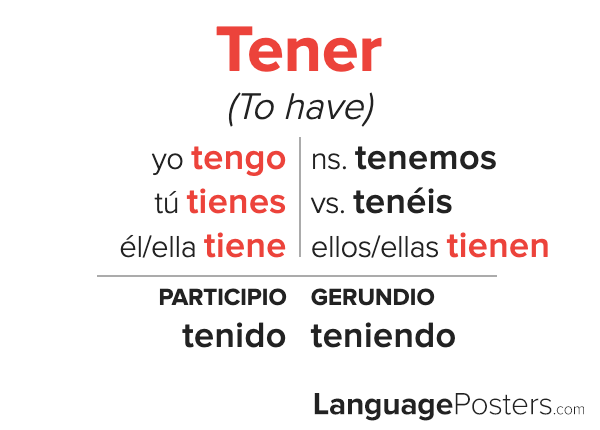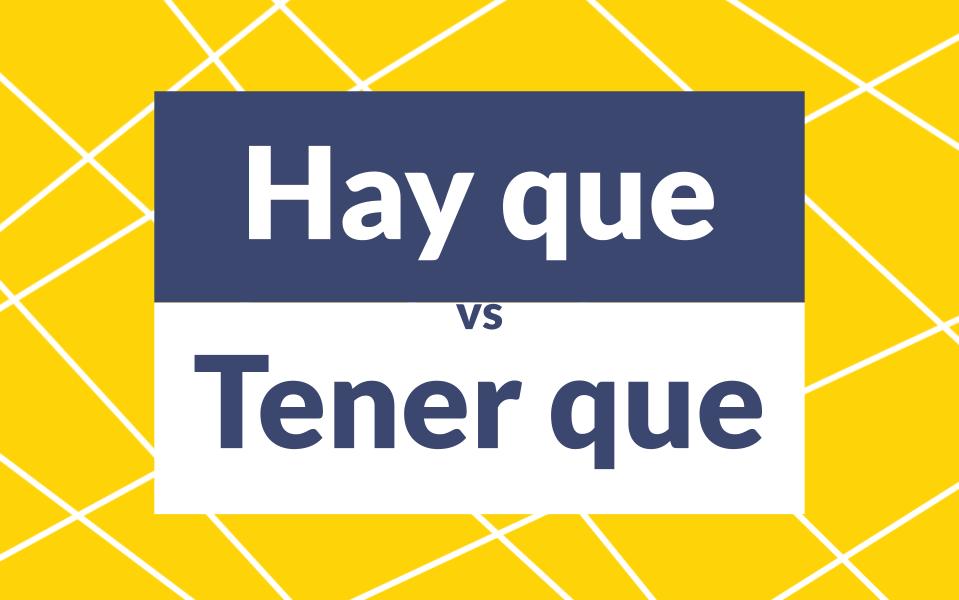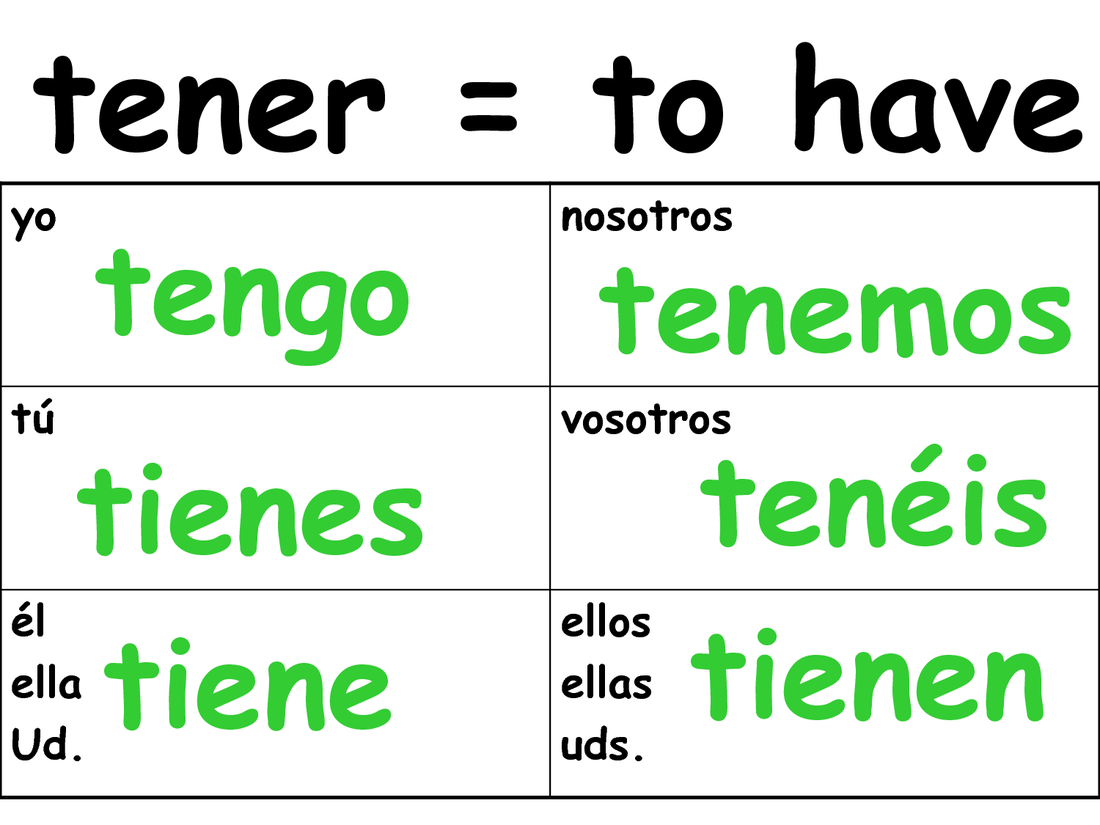Tener Que: A Deep Dive into the Spanish Verb of Obligation
Associated Articles: Tener Que: A Deep Dive into the Spanish Verb of Obligation
Introduction
On this auspicious event, we’re delighted to delve into the intriguing subject associated to Tener Que: A Deep Dive into the Spanish Verb of Obligation. Let’s weave attention-grabbing data and supply recent views to the readers.
Desk of Content material
Tener Que: A Deep Dive into the Spanish Verb of Obligation

The Spanish verb "tener que" interprets to "to must" or "should" in English. In contrast to English, which makes use of a single auxiliary verb ("have" or "should"), Spanish employs a periphrastic building – a mixture of two verbs – to specific obligation. This building makes use of the verb "tener" (to have) adopted by the infinitive of the principle verb. Understanding the conjugation of "tener" is due to this fact essential to mastering the expression of obligation in Spanish. This text offers a complete exploration of the "tener que" conjugation, its nuances, and its purposes in numerous contexts.
The Basis: Conjugating "Tener"
Earlier than delving into "tener que," it is important to grasp the conjugation of the verb "tener" itself. "Tener" is an irregular verb, which means its conjugations do not observe the usual patterns of standard -ar, -er, and -ir verbs. Mastering its conjugations is prime to correct utilization of "tener que."
Here is an entire conjugation of "tener" within the indicative temper:
| Pronoun | Current Tense | Preterite Tense | Imperfect Tense | Future Tense | Conditional Tense |
|---|---|---|---|---|---|
| Yo (I) | tengo | tuve | tenía | tendré | tendría |
| Tú (You – casual) | tienes | tuviste | tenías | tendrás | tendrías |
| Él/Ella/Usted (He/She/You – formal) | tiene | tuvo | tenía | tendrá | tendría |
| Nosotros/Nosotras (We) | tenemos | tuvimos | teníamos | tendremos | tendríamos |
| Vosotros/Vosotras (You all – Spain) | tenéis | tuvisteis | teníais | tendréis | tendríais |
| Ellos/Ellas/Ustedes (They/You all – formal) | tienen | tuvieron | tenían | tendrán | tendrían |
Understanding the Tenses:
- Current Tense (Presente): Expresses ordinary actions, present states, and information. "Tengo que estudiar" (I’ve to review).
- Preterite Tense (Pretérito Perfecto Easy): Describes accomplished actions up to now. "Tuve que trabajar mucho" (I needed to work loads).
- Imperfect Tense (Imperfecto): Describes ongoing or ordinary actions up to now. "Tenía que ir a la escuela todos los días" (I needed to go to high school each day).
- Future Tense (Futuro Easy): Expresses actions that can occur sooner or later. "Tendré que viajar pronto" (I should journey quickly).
- Conditional Tense (Condicional Easy): Expresses hypothetical or conditional actions. "Tendría que llamar a mi madre" (I must name my mom).
Including the Infinitive: Forming "Tener Que"
To kind the "tener que" building, merely conjugate the verb "tener" in keeping with the specified tense and individual, after which add the infinitive of the principle verb. For instance:
- Current Tense: "Tengo que comer" (I’ve to eat), "Tienes que irte" (You must go away), "Tienen que trabajar" (They must work).
- Preterite Tense: "Tuve que estudiar" (I needed to examine), "Tuviste que esperar" (You needed to wait), "Tuvieron que irse" (They needed to go away).
- Imperfect Tense: "Tenía que hacerlo" (I needed to do it), "Tenías que venir" (You needed to come), "Tenían que callarse" (They needed to be quiet).
Nuances and Variations in Utilization:
Whereas "tener que" usually interprets to "must" or "should," its energy of obligation can differ relying on context. It could possibly specific:
- A robust obligation: Much like "should" in English. "Tengo que ir al médico" (I have to go to the physician).
- A average obligation: Extra like "ought to" or "should." "Deberías tener que estudiar más" (It’s best to have to review extra – a barely extra nuanced expression).
- An exterior obligation: An obligation imposed by somebody or one thing else. "Tengo que cumplir con el plazo" (I’ve to satisfy the deadline).
- A self-imposed obligation: An obligation the speaker locations upon themselves. "Tengo que perder peso" (I’ve to drop some pounds).
Comparability with different expressions of obligation:
Spanish provides different methods to specific obligation, every with refined variations in which means and depth:
- Deber: This verb means "to owe" or "ought to." It expresses an ethical or logical obligation, typically weaker than "tener que." "Debo llamar a mi abuela" (I ought to name my grandmother).
- Hay que: This impersonal building means "one should" or "it’s vital." "Hay que limpiar la casa" (The home should be cleaned).
- Necesitar: This implies "to wish." It expresses a necessity, however not essentially an obligation. "Necesito un coche" (I want a automotive).
Utilizing "Tener Que" in Totally different Contexts:
The flexibility of "tener que" permits its use in a variety of conditions:
- Giving directions: "Tienes que seguir estas instrucciones" (You must observe these directions).
- Expressing regrets: "Tuve que cancelar mi viaje" (I needed to cancel my journey).
- Describing routines: "Tenía que levantarme temprano todos los días" (I needed to rise up early each day).
- Planning: "Tendremos que reservar un resort con antelación" (We should guide a resort upfront).
- Expressing guarantees: "Tendré que ayudarte con eso" (I should provide help to with that).
Frequent Errors to Keep away from:
- Incorrect conjugation of "tener": Pay shut consideration to the irregular conjugations of "tener" to keep away from grammatical errors.
- Utilizing the improper tense: Select the tense that precisely displays the timing of the duty.
- Overusing "tener que": Whereas versatile, overuse could make your Spanish sound unnatural. Think about using various expressions of obligation for selection and nuance.
Conclusion:
Mastering the conjugation of "tener que" is a major step in direction of fluency in Spanish. By understanding its numerous tenses, nuances, and purposes, you possibly can specific obligation precisely and naturally in numerous contexts. Keep in mind to follow commonly, taking note of the irregular conjugations of "tener" and contemplating the refined variations between "tener que" and different expressions of obligation. With constant effort, you will confidently navigate the complexities of this important verb phrase and improve your general Spanish communication abilities. This deep dive into "tener que" offers a stable basis for additional exploration of extra superior grammatical buildings and idiomatic expressions in Spanish. Proceed working towards and increasing your information, and you’ll discover your fluency rising steadily.








Closure
Thus, we hope this text has offered invaluable insights into Tener Que: A Deep Dive into the Spanish Verb of Obligation. We thanks for taking the time to learn this text. See you in our subsequent article!